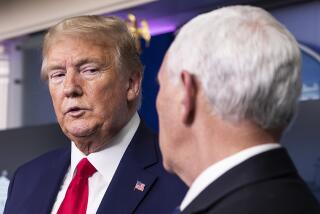Top Shultz Aide Challenges NSC, Reagan on Iran
- Share via
WASHINGTON — The second-ranking official at the State Department, in a virtually unprecedented attack on the National Security Council, deplored the White House unit’s go-it-alone policy of secret contacts with Iranian officials and arms shipments to the Persian Gulf nation.
At the same time, John Whitehead told the House Foreign Affairs Committee today that the State Department has qualms about using the National Security Council in any role but that of an advisory body.
And in testimony that left some committee members stunned, Whitehead, who said he did not learn until 11 a.m. today that he would be sent to testify at the 1:30 p.m. hearing, challenged President Reagan’s assurances that Iran is no longer involved in international terrorist activities.
“I don’t like to have to differ with my President but I believe there is some evidence of Iranian involvement with terrorists,” Whitehead said.
‘Difficult to Cope’
In the intergovernmental flap over the prerogatives of the State Department and National Security Council, he said, “We in the State Department find it difficult to cope with the National Security Council’s operational activities.”
Whitehead said the department welcomes the council’s advisory role.
“But when they become involved in operational matters we have concerns, particularly when we don’t know about them,” he testified.
Whitehead, Secretary of State George P. Shultz’s top aide, was testifying in place of Under Secretary of State Michael H. Armacost, who had originally been scheduled to appear.
“I do think it is time for the White House to come forward with a positive plan to undo the damage quickly,” Whitehead said.
“We in the State Department still do not have a detailed record of what happened.”
‘Token of Seriousness’
Whitehead said Reagan agreed to provide the weapons as “a token of our seriousness” in opening a dialogue to improve U.S.-Iranian relations, end the Iran-Iraq war, diminish Soviet influence and win the freedom of American hostages held in Lebanon.
But he said there is now “no need for further signals of our seriousness” in furthering those goals.
More to Read
Sign up for Essential California
The most important California stories and recommendations in your inbox every morning.
You may occasionally receive promotional content from the Los Angeles Times.










